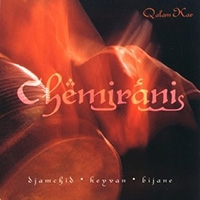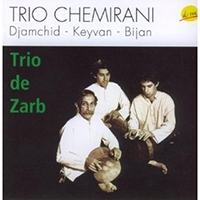PROJECTS
Trio Chemirani
The classical Persian drum, the Zarb, originated in northern Iran, before travelling across Africa and Asia where it became popular with musicians from Turkey, Eastern Europe and North Africa.
One of the Middle East's major instruments of percussion, it is also considered a melodic instrument, since it's played the fingers rather than the palm of the hand.
With as many notes as a piano, the combinations between melody and rhythm are limitless.
Djamchid Chemirani learnt to play in Iran with the great zarb master, Hossein Teherani, whose revolutionary work changed the zarb from an accompaniment to a solo instrument.
Recognised himself as a master of the classical school, Djamchid Chemirani was also seen as a modernist, open to new ideas and styles. When he decided to leave Iran and move to France, he was already one of the only two living zarb masters in the world.
Not only a great musician but also a devoted teacher, Djamchid''s most promising and inspiring pupils were none other than his two sons, Keyvan and Bijan. This new generation would broaden their scope to include other Middle-Eastern frame drums such as the Daf, Bandir and Udu.
Albums from this project
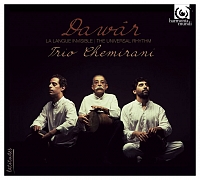
Trio Chemirani
Dawâr (2015)
40 years after his first solo recording for harmonia mundi, Djamchid Chemirani (born in Tehran in 1942) has continued to develop his career, aided by his two sons, Kevyan and Bijan. They have each nourished their craft as musicians by exploring a variety of sound worlds and introducing different cultural and life experiences to the mix. However, they always return to their common goal: to create a universal rhythmic language. Dawâr is the pinnacle of this journey; never have the Chemirani's had such a limpid sound, born from the close fusion of their drum beats; it is through the jubilant awareness of the work they create together, that they achieve the spiritual transcendence so highly regarded within Iranian culture.
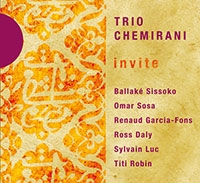
Trio Chemirani
Trio Chemirani invite (2011)
Djamchid, the father and master, Keyvan and Bijan Chemirani, both sons, form since the end of 1990s the Trio Chemirani, a persian percussions set. While drawing from persian poetry, they compose and develop modern forms where the accent is put on polyrythmies and on multiplicity of sounds; the Trio reveals to his public the infinite possibilities of the Persian percussions. The perfect conciseness of the language, vertiginous combined traffic of the dialogue, the infinite variation of the touch with an outstanding complicity, make of this band a scenic and sound recording success.
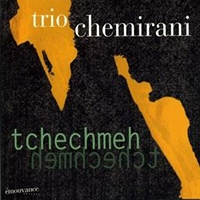
Trio Chemirani
Tchechmeh (2004)
Long sequences in unison, dialogues crossing each other, contrasts, breaks, rhythmic shifts, variety and richness of tone and ornamentation... The Chemirani family (father and two sons) bring us a series of haunting improvisations – dense, fluid, shiftingly elusive in turn – around a long composition entitled "Uchan", after the small village near Tehran where it was written.
Free, weightless, twirling and whirling like a feather on the breeze, this music inspired from sources in medieval Persia moves through its landscape with the unfettered freshness of eternal youth.
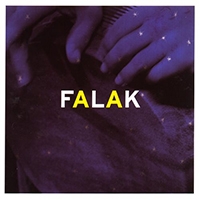
Neba solo Trio & Trio Chemirani
Falak (2002)
With the initiative of Philippe Conrath, the artistic director of the the Africolor Festival, Néba Solo, a well known group from Mali founded around a family of Balafon virtuosos, meets the Chemirani family, originally from Iran and a family of Zarb virtuosos . It was at Sikasso in Mali, that the very first rehearsals took place, and as result of this fabulous reunion, they have left us the magnificent and spectacular recording Falak as testimony.
Videos
Trio Chemirani
Trio Chemirani from Hadrien Bels on Vimeo.
